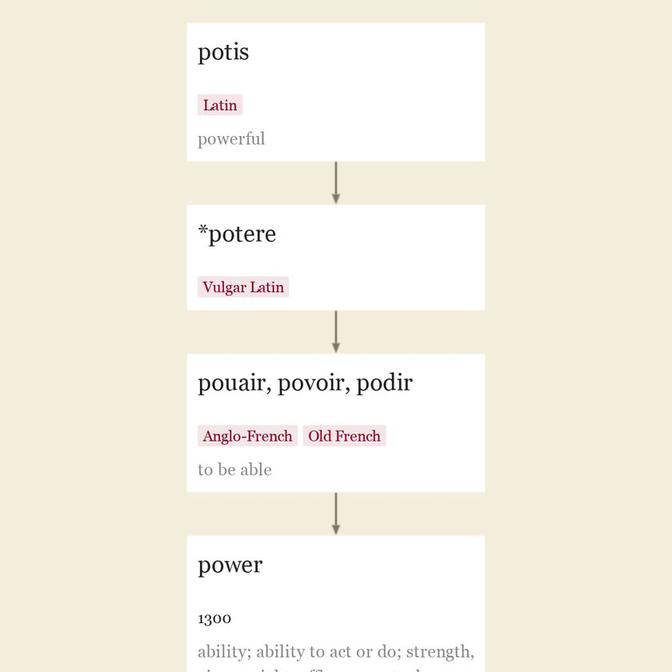c. 1300, pouer, "ability; ability to act or do; strength, vigor, might," especially in battle; "efficacy; control, mastery, lordship, dominion, ability or right to command or control; legal power or authority; authorization; military force, an army," from Anglo-French pouair, Old French povoir, noun use of the infinitive, "to be able," earlier podir (9c.), from Vulgar Latin *potere (source also of Spanish poder, Italian potere), from Latin potis "powerful" (from PIE root *poti- "powerful; lord").
Whatever some hypocritical ministers of government may say about it, power is the greatest of all pleasures. It seems to me that only love can beat it, and love is a happy illness that can't be picked up as easily as a Ministry. [Stendhal "de l'Amour," 1822]
Meaning "one who has power, person in authority or exercising great influence in a community" is late 14c. Meaning "a specific ability or capacity" is from early 15c. In mechanics, "that with which work can be done," by 1727.
Sense of "property of an inanimate thing or agency of modifying other things" is by 1590s. Meaning "a state or nation with regard to international authority or influence" [OED] is from 1726. Meaning "energy available for work is from 1727. Sense of "electrical supply" is from 1896.
Colloquial a power of for "a large quantity of, a great number of" is from 1660s (compare powerful). Phrase the powers that be "the authorities concerned" is from Romans xiii.1. As a statement wishing good luck, more power to (someone) is recorded from 1842. A man-advantage power play in ice hockey so called by 1940. Power failure "failure of the (electrical) power supply" is from 1911; power steering in a motor vehicle is from 1921. Power politics "political action based on or backed by threats of force" (1937) translates German Macht-politik.
"to supply with power," 1898, from power (n.). Earlier it meant "make powerful" (1530s). Related: Powered; powering.
c. 1400, pouerful, "mighty, having great strength or power," from power (n.) + -ful. Sense of "capable of exerting great force or power" is from 1580s.
Meaning "of great quality or number" is from 1811; hence the colloquial sense of "exceedingly, extremely" (adv.) is from 1822. Thornton ("American Glossary") notes powerful, along with monstrous, as "Much used by common people in the sense of very," and cites curious expressions such as devilish good, monstrous pretty (1799), dreadful polite, cruel pretty, abominable fine (1803), "or when a young lady admires a lap dog for being so vastly small and declares him prodigious handsome" (1799).
This gross perversion is common in several of the Western counties of Pennsylvania, to which region I had supposed it was limited. A gentleman informs me, however that it is not unfrequent in the South, and that he has even heard it yoked with weak, as, A powerful weak man. [Seth T. Hurd, "A Grammatical Corrector; or, Vocabulary of the Common Errors of Speech," 1847]
Related: Powerfully; powerfulness.
also horse-power, unit for measurement of the rate at which a motor works, 1805, from horse (n.) + power (n.); established by Watt as the power needed to lift 33,000 pounds one foot in one minute, which actually is about 1.5 times the power of a strong horse. Much abused in 19c. technical writing as "very fallacious," "shockingly unscientific," etc.
1944, in the geopolitical sense of "nation with great interest and ability to exert force in worldwide theaters of conflict," from super- + power (n.).
The word itself is attested in physical senses by 1921 in reference to coordinated generation by multiple power plants; by 1922 in a general sense of "a power of a greater kind or degree than ordinary."
"to give power or authority to, authorize as by law," 1650s, also impower, from assimilated form of en- (1) + power (n.). Used by Milton, Beaumont, Pope, Jefferson, Macaulay, but the modern popularity dates from 1980s (see empowerment). Related: Empowered; empowering.
mid-15c., puissaunt, "powerful, influential, in a position of authority; physically strong," from Old French puissant "strong, mighty, powerful," earlier poissant (12c.), from stem of Old French poeir "to be able" (see power (n.)). Related: Puissantly.

